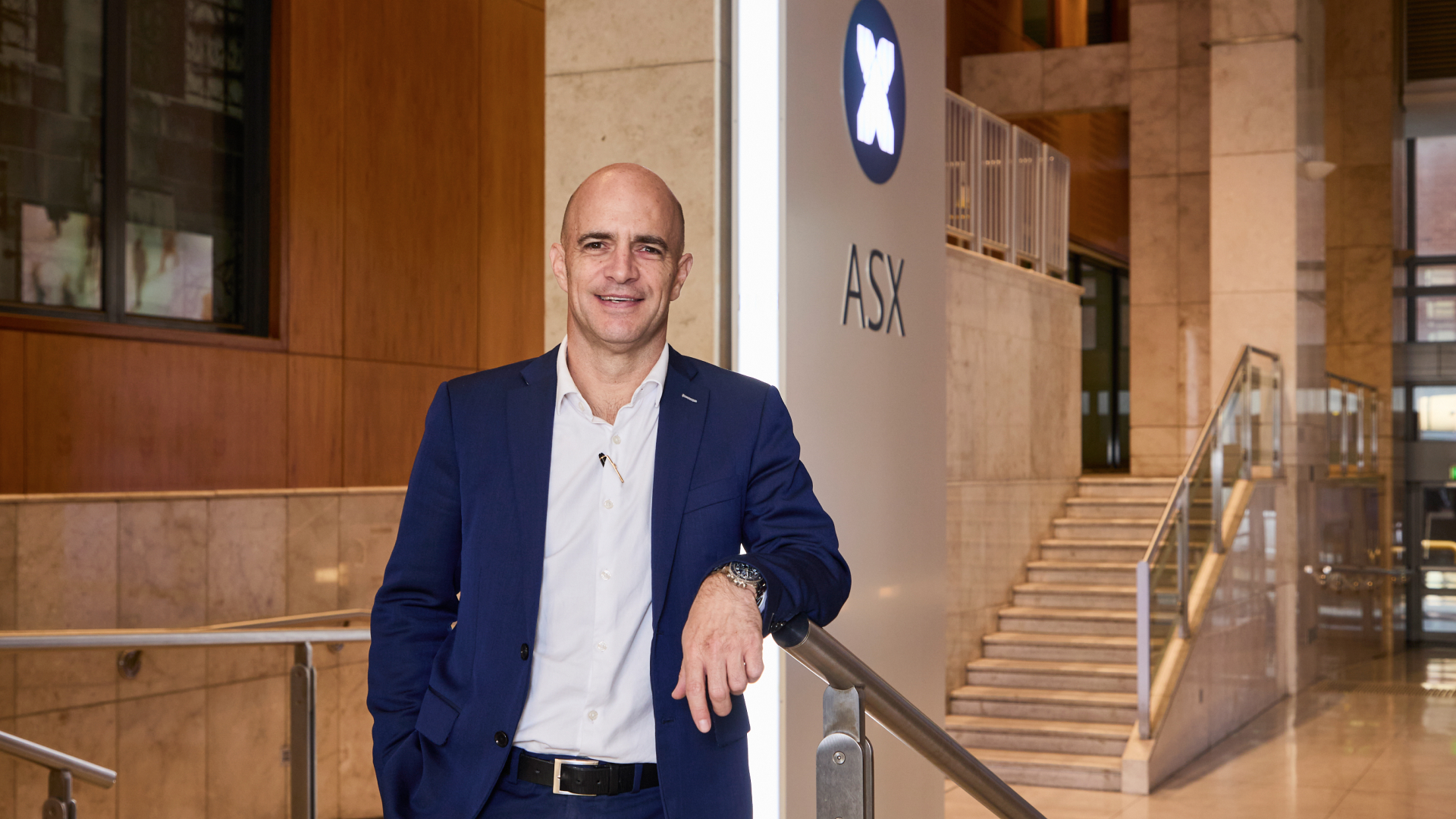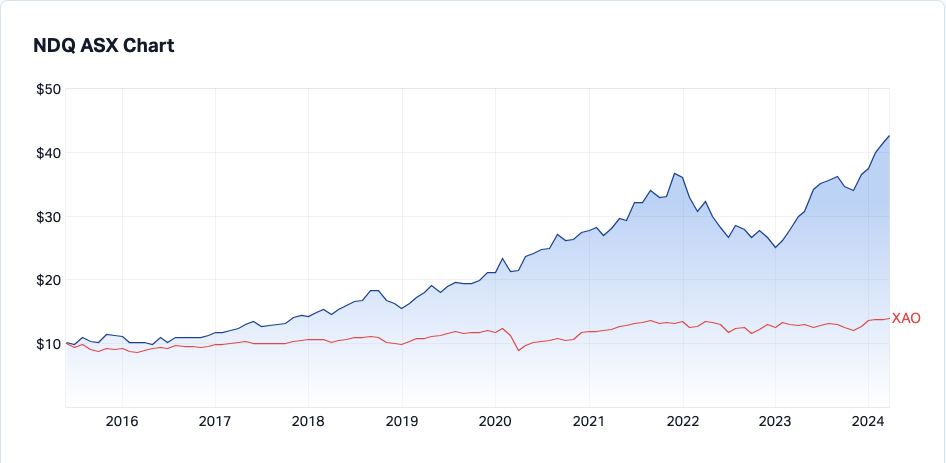8 ETFs for a high growth, low cost portfolio
There's a reason investors are drawn to the stock market and keep returning, despite the reality of painful sell-offs that can take you on an emotional rollercoaster. Investing in equities has been an incredible way to build wealth over long periods of time.
I'm not talking about speculation or punting on a hot tip; I'm talking about holding a decent allocation to growth assets and letting them compound over many years. Simple, right? Not quite. No matter how compelling the evidence that switching in and out of the market will hurt your returns, it remains one of, if not the biggest, challenges investors need to overcome.
As part of Livewire's Listed Series, I hosted a panel session with Sebastian Ferrando from Koda Capital and Cameron Gleeson from Betashares to discuss the outlook for growth as well as some tips and techniques for building a high-growth portfolio.
What is growth investing?
Growth assets are investments that can increase in value over time and produce income. The NASDAQ in the US is a great example of an index that has delivered impressive growth, and Australian residential property is another asset class that has created long-term wealth for many people.
Cameron Gleeson from Betashares makes the timely point that growth assets also provide a natural hedge against inflation and help protect your capital's purchasing power.
"The other advantage beyond wealth creation is that equities are a great long-term inflation hedge. Things like cash aren't necessarily an inflation hedge - equities do that. So if we're building long-term wealth and capital growth, growth equities are a great way to go," says Gleeson.
Is it a good time to invest in growth assets?
The honest answer is probably yes and no. (It will also depend on your objectives.)
In late October last year, it became clear that central banks had started to win the battle against inflation, which set a fire under growth assets. The NASDAQ has rallied 70% in less than five months.
My colleague Kerry Sun recently highlighted research from Macquarie that attempts to capture equity market sentiment. It's called the FOMO meter, and it is close to peak FOMO.
Equity indices hitting new highs doesn't necessarily mean a sell-off is imminent, Macquarie analysts conclude.
"When initial sentiment is this high, US stock returns tend to be below average in the following year, while ASX returns could be slightly negative," Macquarie analysts wrote.

On a positive note, Gleeson says Betashares believes that we're likely to avoid recession, which means we're not likely to see those big bear market drawdowns.
"In most equity markets, if you don't have a high probability of recession, we tend to find that you can see corrections if investors think the market has got a bit ahead of itself. But you tend not to see those large bear markets. They tend to be associated with true recessions which create an earnings recession," Gleeson says.
Just because stocks have had a good run doesn't necessarily mean they are expensive if their earnings are also growing quickly. For example, Nvidia's (NASDAQ: NVDA) PE ratio of 33 times earnings is lower than many ASX-listed growth stocks such as REA Group (ASX: REA) and WiseTech Global (ASX: WTC) - yet it has experienced phenomenal share price gains, explains Sebastian Ferrando from Koda Capital.
"Just to put that in context for a second, in the Aussie market, ARB (ASX: ARB), which makes bull bars and car accessories, has a P/E of 33 times. So I asked this person and I regularly asked myself, do you want to own cars, car parts and bull bars or the potential future of the world? I reckon that answer's pretty easy," Ferrando said.

How can you manage volatility in growth assets?
Volatility is part of the journey with growth investing. Knowing how much volatility you can stomach is an important starting point that will influence your allocation.
Ferrando says a diversified portfolio with an allocation to defensive assets, like bonds, is a proven technique that can smooth out the journey.
He also says equal-weight ETFs can be a way to overcome the concentration created when a small number of equities can dominate an index as banks do on the ASX.
Gleeson emphasises the importance of avoiding too much overlap and cross-holding within a portfolio. He says using a core/satellite approach, where specific growth exposures are added to a core portfolio, is a good technique, but you need to ensure there is not too much overlap across holdings, as it can increase volatility.
"Taking the example of (ASX: HACK), our global cybersecurity ETF, there's only around 6% weighting in cybersecurity within something like the NASDAQ. So we can see how this can be quite a good compliment to what you may hold in the core, adding a bit of diversification," Gleeson says.

Investing in high-growth assets often comes with volatility. I own a high-growth ETF in my portfolio that fell more than 40% in a year. It has since recovered, but it was a wild ride.
Building a position over time and having uncorrelated assets in my portfolio allowed me to take advantage of the drawdown rather than selling out and missing the recovery.
If you find volatility unnerving, you might be interested in reading this article, which looks at the ten most consistent ETFs on the ASX.
What are some of the attractive growth opportunities in 2024
Ferrando says the core of his growth allocation is in US equities, and specifically, he says his go-to ETFs for growth are the iShares S&P 500 ETF (ASX: IVV) and Betashares NASDAQ 100 ETF (ASX: NDQ).
"The US is the home of the growth market. So I skew heavily towards the US. "
In addition, he says the healthcare sector has good long-term growth dynamics and is also finding growth opportunities in thematics such as energy transition.
7 high growth ETFs from Betashares
Gleeson shares a selection of the growth ETFs from the Betashares product line. The Betashares Nasdaq 100 ETF (ASX: NDQ) was the #1 tipped ETF in Livewire's annual Outlook Series Survey.
"These are now global stalwarts. If you look at the revenue composition or where these companies earn their revenue, it's very globally diversified. So it's a good global core."

The Betashares Global Cash Flow Kings ETF (ASX: CFLO) is a new product focusing on companies with strong free cash flows.
In the thematic bucket, Gleeson points to the Betashares Global Cybersecurity ETF (ASX: HACK) and Betashares Global Robotics and Artificial Intelligence ETF (ASX: RBTZ), which owns companies that can benefit from the automation of manufacturing and supply chains.
He highlights the Betashares Japan ETF-Currency Hedged ETF (ASX: HJPN) for non-US centric exposures.
"Japanese equities tend to go well within the yen depreciates, so having a currency hedge exposure works well in basically hedging out the depreciation of the yen and you get a nice carry, actually get about 4% per annum from that hedging activity as a tailwind."
He also highlights the Betashares India Quality ETF (ASX: IIND) and the Betashares Asia Technology Tigers ETF (ASX: ASIA), providing exposure to Asian technology, which he describes as "somewhat unloved but relatively cheap."
More from 2024 Listed Series

Learn how to choose the right exchange traded products for your goals, like growth or income, and build your perfect portfolio on the ASX.
- 4 tips and tricks every ASX ETF investor should know
- The best ASX ETFs to help protect and grow your portfolio
- Hunting for double-digit returns with lower levels of risk
- Why this US$77 billion investor is investing in more defence when others are chasing growth

3 contributors mentioned


